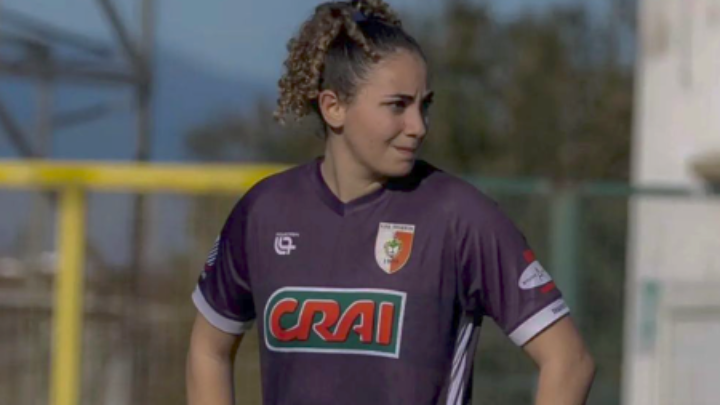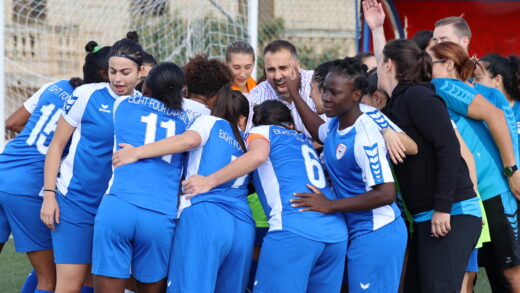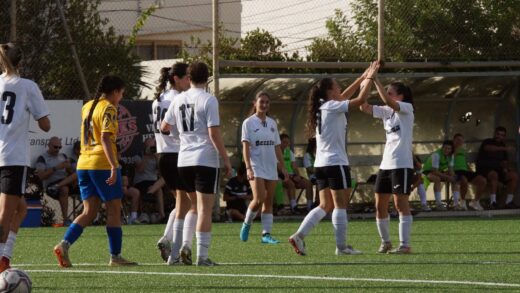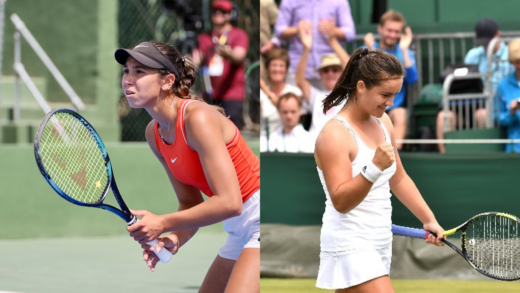Raisa Costantino made her first leap away from the Maltese league last summer, joining Serie C side SPD Tharros, from Malta’s Hibernians. The eighteen-year-old goalkeeper has been heavily involved as the Sardinian side attempts to stick the landing in Serie C, following their promotion last season.
The name Costantino is well known in the women’s camp in Malta, between her mum, Sharon Costantino, as a goalkeeper for Malta, and her dad Kenneth Costantino’s involvement in coaching in the local league. However, Raisa Costantino is striving to making her own name and story in the game.
The Sporting Fan caught up with Costantino on life in Sardinia, including the challenges experienced in getting accustomed to a new league, while discussing all the change that a move into another country brought for the player. Having grown up with parents heavily involved in shaping the women’s game in Malta and in shaping her development as a young goalkeeper, we also discussed the reality of experiencing a different setting.
Finally, we explored the feeling in the camp as Malta’s women’s team secured promotion into League C last December and the motivation it brings to go to the next level.
Eleanor Saliba (ES): This year you made the leap to go to SPD Tharros to pursue a professional career. Now that you’ve gotten a bit of a taste, how do you gauge the experience so far?
Raisa Costantino (RC): The first four months were a lot more difficult than I expected them to be personally, even if I was prepared that it would be a challenge overall. I think moving away from home is always difficult, but especially considering how close we are as a family, the change in the home environment was not easy. However, I changed houses over the turn of the year and things gotten much better.
ES: What is a typical day like for you?
RC: So in the morning I work on some online courses because I’m still studying. I go to the gym and then I have around four hours of training almost every day. So, most of the day is consumed by training. The extra time in training allows more work to be done on details which when in Malta we did not have time to go into.
ES: Now as a goalkeeper, your mum certainly taught you the ropes early on. What has that it been like for you to go into a new environment, with new coaches and what are some of the major differences you noticed?
RC: Yes, so I train with the men’s team, which is different to what I had in Malta. It means that the power and strength I train against and with, is a lot more than what I was used to in Malta. Because of this, the shots I train against, for example, are a lot more powerful than what I am challenged with in most matches in the women’s league.
ES: What are the major differences you observe in the level of teams and the style of football between the Assikura Women’s League and the Serie C?
RC: I think in Malta there are eight teams but the level in the league is perhaps split into four teams and four teams. So, as a goalkeeper you know that there are matches which will work you a lot, but then there are others in which you will be less so.
There are still some teams which are low in level here compared to the rest and there are still some very one-sided score-lines. However, the difference is that maybe there are two out of sixteen, which means that as a goalkeeper you are getting tested mostly in every match. Even these lower-level teams are less predictable and there were other matches where they frustrated us a lot and it was a huge challenge to score a goal against them. So, the league is less predictable than in Malta for sure. Teams focus a lot more on both tactics and the physical aspect.
As regards the style of play, there’s a lot more willingness to attack from all, and then there are teams like Lumezzane, who push a very high defensive line as well. These things also affect the training during the week, where there is an element of tailoring sessions according to the opponent we will be facing. So, putting that together means that you are constantly learning as well because it changes from week to week depending on the opponent.
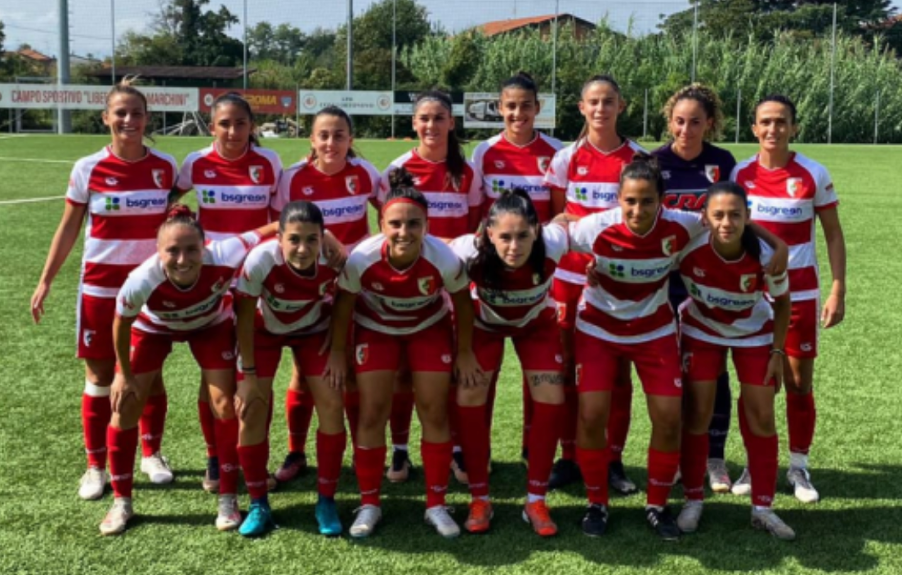
ES: What has been the most memorable match so far?
RC: We broke the club’s record for biggest win against Caprera, winning by 10-0. So, it was nice to form part of that history. However, besides that we had a match against Monterosso who last year eliminated the team from the Coppa Italia. This season, our attacker got a hat-trick on her birthday. We had a lot of motivation to get that revenge, so putting it all together was a memorable moment.
ES: One aspect that is different about Malta is the small distance and the fact that you play in the same stadiums and know what to expect. So now that away games are an actual reality, do you feel that there are any differences for you in how they affect the team and yourself?
RC: Since I am in Sardinia, the away games I experience are probably the biggest contrast you can get to what I experienced in Malta. Sometimes we have more than thirty hours of travelling. Sometimes we leave on Saturday at 5 pm and get home on Monday at 2 am. This is since we must go by ferry or by plane (where sometimes you have no direct flights either). This besides a bus trip.
It’s a challenge physically but also mentally. Typically, Monday is a rest day to recover. However, I try to go to do some training with the men’s team because it helps me to refocus myself into the week. Perhaps training with all the three age-groups in Malta helped me in a sense to have the physical stamina for this.
ES: Away from the pitch, I understand that the first few months presented challenges. It is a real challenge that many face and it does not always have a happy ending. How do you review those first months in terms of growth even from a personal perspective?
RC: I call my family every day. That connection is something that is important to me, even just a few minutes of conversation. Since the language here is also a change for me and something I’ve had to slowly adapt to, that ability to vent freely with them at the end of the day was very useful (laughs). The language barrier was something that I had to overcome, because everything is in Italian, even training. I think these things are perhaps overlooked at times. However, I think living in a country where you are meeting the language every day enables a lot of practice and you learn quite quickly as well.
ES: Coming from a family of football-oriented parents who likely have been around in every game, what has it been like to play games away from their eyesight, while also not being able to see their own exploits with Hibernians?
RC: It’s important for me to say that even though they are football-oriented, it was always a choice for me and my brother to go into football, and in fact he stopped. However, they were always supportive, so when this opportunity arose, they encouraged me. My mum told me very clearly that she would have taken the opportunity if she had it when she was my age. I think it was in a sense perfect timing for me to leave because maybe I had not put down certain roots.
It was certainly difficult not to have them around to watch matches. Of course, until last year they were there at every game, my mum as a coach and my dad as a supporter and even as a coach. I think it was even more difficult for them, maybe even more than for me. My mum now follows the matches through notifications on an app, which is difficult after eleven years of being able to watch the matches live and coaching me to get to the level where I could get this opportunity.
On the other hand, Hibernians is very much a part of me and it is a team I love very much. I was very close to my teammates there, whereas here the environment is different and perhaps I’m not as close. Last year we were like family at Hibernians. So, it was a challenge but you adapt.
ES: You were called up for the final round of fixtures of the UEFA Women’s Nations League. What was it like to be in that atmosphere of the final stint for promotion and how much does it push you to train further?
RC: There was a lot of pressure and tension on everyone, but in a sense it was also one of the greatest experiences. I am not a person that feels that much pressure before a match, perhaps there’s a little bit of excitement, but I have to say I felt the pressure in that round. It was something new for me, even though I was not playing. I think it was a difficult one for all because the pressure to perform was real.
However, for me being in that position to feel it during training and in the dressing room, firsthand, was unique. I don’t think you see it or feel it from the outside. I think there was a real pressure to deliver, knowing that earning that promotion could be important to push women’s football to be more noticeable and to get more support toward it.
Considering also that my mum played in a time when the national team was just starting, I know how much effort the previous players put in without getting a cent back, to get women’s football to where it is today, where players in the national team even get bonuses. They sacrificed a lot for us to have these opportunities. Putting that together with seeing players like Rachel (Cuschieri), Ylenia (Carabott) and Dorianne (Theuma), who have played for the national team for a long time and seen the women’s game change, I think you could see what it meant to get to that point and earn that promotion.
ES: What are your goals for the rest of the season?
RC: Last year the team got promoted, so our aim is to remain in League C and try to get to the best position that we can while doing that. There’s a lot of respect and professionalism in the team, we leave it all out on the pitch. It is perhaps something that I did not expect to be so apparent at Serie C level, but is certainly there in training and during matches, which is important to reach the goal.
Quick-Fire Questions:
- Play in cold or hot weather? – cold
- A habit you developed since moving to Sardinia? – using Italian words while speaking Maltese or English
- A place you would suggest visiting from the one you’ve played in? – Bergamo
- Favourite football player? – Ederson
- If you were not a goalkeeper, what would you be? – Striker
- How do you wind down after a match? – have a chat with my parents
- Your cooking or parent’s cooking? – my mum’s cooking is a lot better for sure
- Night out or night in? – Night In, I’m definitely a home body.
- Dream competition to play in? – Women’s Super League
- Dream stadium to play in? – Stamford Bridge
The Sporting Fan would like to thank Raisa Costantino for her time to be able bring you this feature, while wishing her the best on the remainder of the season and beyond.
Follow The Sporting Fan on social media: Instagram ~ Facebook ~ X
